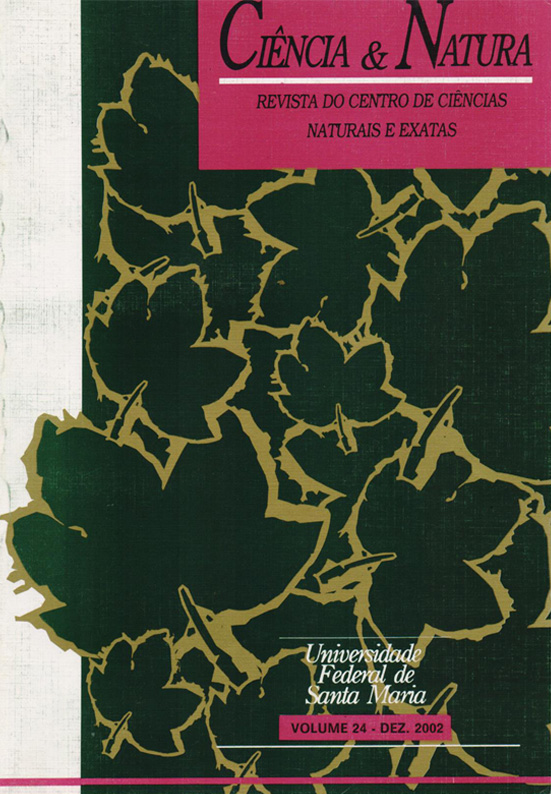Recursos minerais do município de Santa Maria
DOI:
https://doi.org/10.5902/2179460X27232Resumo
O Brasil tem ampla diversificação de recursos naturais, devido a geologia de cada região, engloba a mineração como um processo que reúne um avanço econômico e ao mesmo tempo pode causar desequilíbrio e agressões ao meio ambiente. O município de Santa Maria, no seu potencial mineral e visando à criação de empregos imediatos ligadas principalmente aqueles relacionados com a construção civil, que desenvolve prioritariamente as lavras de argilas, areias e de água mineral. O impacto visual causando pela atividade de extração mineral muda a imagem do município, principalmente, devido a extração da mata ciliar e devido a erosão decorrente, tornando a recuperação destas áreas lentas e complexas. A extração mineral, nesse município, busca o desenvolvimento econômico e social, na sustentabilidade dos recursos relacionada com a indústria da construção civil.
Downloads
Referências
AKINAGA, R.M. Palestra de Abertura. In: Seminário Internacional sobre Mineração. Anais, São Paulo, 1989.p.14
BRASIL, Departamento Nacional de Produção Mineral. Código de Mineração e Legislação Correlativa. Ed. ver. Por Humberto de Carvalho Matos - Brasília, Divisão de Fomento de Produção Mineral, 1982.
BRASIL, Departamento Nacional de Produção Mineral. Curso de controle da Poluição na Mineração: alguns aspectos. 1986.
CMMAD - Comissão Mundial sobre Meio Ambiente e Desenvolvimento. "Nosso Futuro Comum". 2a ed., Rio de Janeiro, FGV, 1991. P. 49.
CHRISTOFOLETTI, A. Geomorfologia. São Paulo: Edgar Bucher, 1980.
FORNASARI Fº,N.; LEITE, C.A.G.; PRANDINI, F.L. & AZEVEDO, R.M.B. Avaliação Preliminar dos Problemas Causados pela Mineração no Meio Ambiente no Estado de São Paulo. S.n.t.
INSTITUTO BRASILEIRO DO MEIO AMBIENTE E DOS RECURSOS NATURAIS RENOVÁVEIS - IBAMA. Manual de recuperação de áreas degradadas pela mineração. Técnicas de revegetação. Brasília, 1990.
INSTITUTO BRASILEIRO DE MINERAÇÃO - IBRAM. Mineração e meio ambiente. www.org.ibram.br/com Brasília, 2001.
RECUPERAÇÃO E MANEJO DE ÁREAS DEGRADADAS, 1997. Campinas. Memória do Workshop. Jaguariúna: EMBRAPA-CNPMA, 1998. 70. (EMBRAPA-CNPMA. Documentos 13).
SILVA, Gustavo Siqueira da Determinação e Mapeamento da Atividade Mineira em Santa Maria, sua Participação na Economia do Município, sua Relação com outras Atividades Econômicas e o Impacto Ambiental. Trabalho de Graduação. UFSM - Santa Maria
SCLlAR, C. Minerar é preciso?, Porto Alegre: PUCRS. Anais da 51ª Reunião Anual da SBPC, 1999
Downloads
Publicado
Como Citar
Edição
Seção
Licença
Para acessar a DECLARAÇÃO DE ORIGINALIDADE E EXCLUSIVIDADE E CESSÃO DE DIREITOS AUTORAIS clique aqui.
Diretrizes Éticas para Publicação de Revistas
A revista Ciência e Natura está empenhada em garantir a ética na publicação e na qualidade dos artigos.
A conformidade com padrões de comportamento ético é, portanto, esperada de todas as partes envolvidas: Autores, Editores e Revisores.
Em particular,
Autores: Os Autores devem apresentar uma discussão objetiva sobre a importância do trabalho de pesquisa, bem como detalhes e referências suficientes para permitir que outros reproduzam as experiências. Declarações fraudulentas ou intencionalmente incorretas constituem comportamento antiético e são inaceitáveis. Artigos de Revisão também devem ser objetivos, abrangentes e relatos precisos do estado da arte. Os Autores devem assegurar que seu trabalho é uma obra totalmente original, e se o trabalho e / ou palavras de outros têm sido utilizadas, isso tem sido devidamente reconhecido. O plágio em todas as suas formas constitui um comportamento publicitário não ético e é inaceitável. Submeter o mesmo manuscrito a mais de um jornal simultaneamente constitui um comportamento publicitário não ético e é inaceitável. Os Autores não devem submeter artigos que descrevam essencialmente a mesma pesquisa a mais de uma revista. O Autor correspondente deve garantir que haja um consenso total de todos os Co-autores na aprovação da versão final do artigo e sua submissão para publicação.
Editores: Os Editores devem avaliar manuscritos exclusivamente com base no seu mérito acadêmico. Um Editor não deve usar informações não publicadas na própria pesquisa do Editor sem o consentimento expresso por escrito do Autor. Os Editores devem tomar medidas de resposta razoável quando tiverem sido apresentadas queixas éticas relativas a um manuscrito submetido ou publicado.
Revisores: Todos os manuscritos recebidos para revisão devem ser tratados como documentos confidenciais. As informações ou ideias privilegiadas obtidas através da análise por pares devem ser mantidas confidenciais e não utilizadas para vantagens pessoais. As revisões devem ser conduzidas objetivamente e as observações devem ser formuladas claramente com argumentos de apoio, de modo que os Autores possam usá-los para melhorar o artigo. Qualquer Revisor selecionado que se sinta desqualificado para rever a pesquisa relatada em um manuscrito ou sabe que sua rápida revisão será impossível deve notificar o Editor e desculpar-se do processo de revisão. Os Revisores não devem considerar manuscritos nos quais tenham conflitos de interesse resultantes de relacionamentos ou conexões competitivas, colaborativas ou outras conexões com qualquer dos autores, empresas ou instituições conectadas aos documentos.






